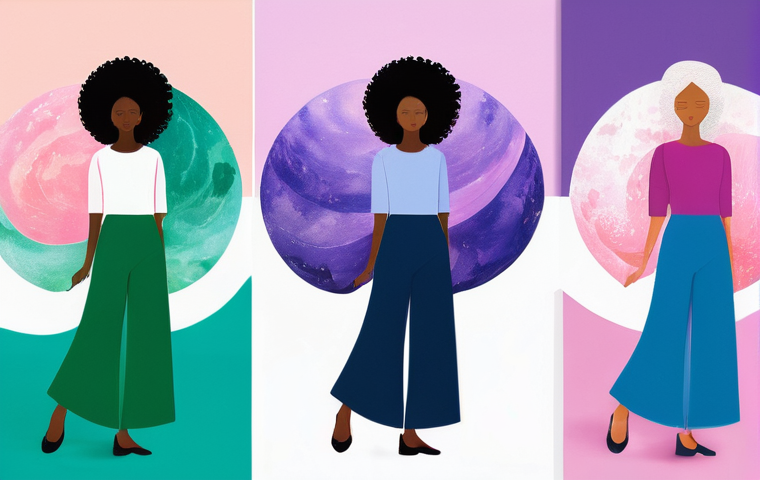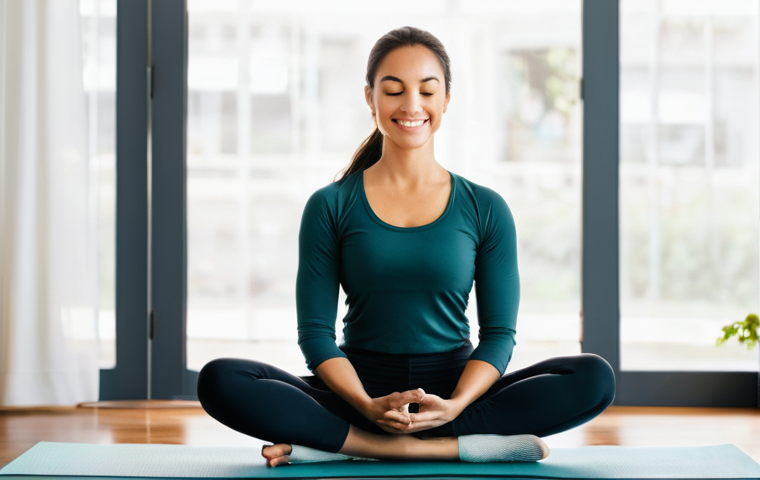Let’s be real for a moment: navigating the world of sex education and women’s health can feel like walking through a minefield of misinformation and awkward silence.
For far too long, these vital topics have been shrouded in mystery, leaving countless individuals feeling confused, misinformed, or even ashamed. From countless conversations and my own personal deep dives into this subject, I’ve come to realize just how crucial it is to have access to clear, accurate, and empowering information.
It’s not just about textbook facts; it’s about understanding our bodies, making informed decisions, and advocating for our own well-being in a world that often overlooks female health concerns.
In an era where online content is king, it’s more important than ever to cut through the noise and find genuinely helpful resources that address modern challenges and evolving understandings of health and relationships.
So, if you’re ready to peel back the layers, bust some myths, and equip yourself with knowledge that truly makes a difference, let’s dive in deeper below and discover the truth together!
Decoding Our Bodies: Beyond the Basics

Let’s be real for a moment: how much do we *really* know about our own bodies, beyond what we learned in a rushed health class? I remember feeling completely in the dark about so many fundamental aspects of female anatomy and physiology, and it wasn’t until my late twenties that I truly started to connect the dots.
It’s not just about understanding the names of organs; it’s about grasping the intricate dance of hormones, the subtle signs our bodies send us, and the incredible resilience within.
From the ebb and flow of our menstrual cycles, which are far more than just a monthly inconvenience, to the complex symphony of our reproductive system, there’s a universe of knowledge waiting to be explored.
We’re often taught a very linear, almost clinical, version of events, but our experiences are anything but. Understanding these basics isn’t just academic; it’s empowering.
It helps us interpret symptoms, make informed health decisions, and truly feel at home in our own skin. When I finally started digging deeper, I felt a sense of clarity and control I hadn’t known before, and I genuinely believe everyone deserves that feeling.
It truly transforms how you approach your health.
The Menstrual Cycle: More Than Just a Period
I used to dread my period, seeing it as a disruption rather than a vital sign. But honestly, viewing the menstrual cycle solely through the lens of bleeding is like reading only the last chapter of an incredible book.
Our cycles are a dynamic four-phase process—menstrual, follicular, ovulatory, and luteal—each bringing its own unique hormonal shifts and potential impacts on our mood, energy, and even creativity.
For instance, during the follicular phase, I often feel a surge of energy and mental clarity, perfect for tackling new projects, while the luteal phase can bring a more introspective, nesting urge.
Understanding these phases allows us to better anticipate our physical and emotional states, optimize our routines, and work *with* our bodies instead of against them.
It’s a powerful shift in perspective, moving from frustration to genuine appreciation for our body’s natural rhythms. Learning to track my cycle, not just for fertility, but for overall well-being, has been a game-changer for me.
It’s like having a secret superpower – knowing when to push and when to rest.
Navigating Your Anatomy: A User’s Guide
When I was younger, even talking about “down there” felt awkward and taboo. But think about it: we’re given user manuals for our phones and cars, so why not our own bodies?
Getting familiar with your vulva, vagina, uterus, and ovaries isn’t about being a medical expert; it’s about basic self-awareness. Knowing what “normal” looks and feels like for *you* is incredibly important for spotting anything unusual early on.
I encourage everyone to literally get a mirror and take a look, or at least understand the basic components. What’s often called the “vagina” is actually a complex external structure called the vulva, which includes the labia, clitoris, and vaginal opening.
The vagina itself is an internal canal. This foundational knowledge removes the mystery and replaces it with confidence. It’s about demystifying our own physical selves, shedding the layers of societal discomfort that have historically kept us from truly owning our bodies.
This understanding is key for everything from sexual health to recognizing potential health issues.
The Hormone Rollercoaster: Understanding Your Inner Symphony
Honestly, sometimes I feel like my hormones are playing a wild symphony, and I’m just trying to conduct it without dropping the baton! It’s wild how much these tiny chemical messengers influence literally everything – from our moods and energy levels to our skin, sleep, and reproductive health.
For years, I struggled with unpredictable mood swings and persistent fatigue, just shrugging it off as “that’s just how I am.” It wasn’t until I started delving into the intricacies of hormonal balance that I realized many of these experiences were tied to fluctuations in estrogen, progesterone, and even thyroid hormones.
We often hear about them in the context of puberty, pregnancy, and menopause, but their impact is constant. Understanding how different factors like stress, diet, sleep, and even environmental toxins can disrupt this delicate balance has been a revelation.
It’s not about achieving perfect balance all the time – because let’s face it, life happens – but about recognizing the signs of imbalance and knowing when to give your body a little extra support.
This journey of self-discovery around hormones has made me so much more empathetic towards myself and others. It’s like finally understanding the script to a play you’ve been acting in your whole life.
Estrogen, Progesterone, and Beyond
When we talk about female hormones, estrogen and progesterone often steal the spotlight, and for good reason. Estrogen, often seen as the “female hormone,” plays a crucial role in developing and maintaining the reproductive system, regulating the menstrual cycle, and even impacting bone health and mood.
Progesterone, on the other hand, is vital for preparing the uterus for pregnancy and maintaining it, and it also has calming effects that can influence our sleep and anxiety levels.
But the story doesn’t end there! We also have testosterone, often considered a “male hormone,” which women produce in smaller amounts and is essential for libido, energy, and bone density.
Then there’s cortisol, our stress hormone, and thyroid hormones, which regulate metabolism. All these players interact in a complex web, and a slight imbalance in one can create a cascade of effects throughout the body.
I’ve personally experienced how much stress can impact my progesterone levels, leading to sleep disturbances and irritability, proving just how interconnected everything is.
Lifestyle’s Impact on Hormonal Harmony
It’s tempting to think of hormones as something entirely out of our control, but I’ve found that our lifestyle choices have a massive impact on their delicate balance.
Think about it: chronic stress elevates cortisol, which can then interfere with estrogen and progesterone production. A diet rich in processed foods and sugar can lead to insulin resistance, affecting not only our blood sugar but also other hormones.
Sleep deprivation throws everything off, making our bodies work harder to produce essential hormones. Even things like exposure to endocrine-disrupting chemicals found in plastics and some cosmetics can mimic or block our natural hormones.
On the flip side, a balanced diet, regular exercise, stress management techniques like meditation or yoga (which I swear by!), and prioritizing quality sleep can truly work wonders.
I’ve seen firsthand how cleaning up my diet and committing to regular movement significantly improved my energy levels and stabilized my moods during different phases of my cycle.
It’s not about perfection, but about making consistent, mindful choices that support your body’s natural wisdom.
Empowering Choices: Contraception and Reproductive Freedom
Let’s talk about power, real power. For me, a huge part of feeling truly empowered comes from having control over my own body and reproductive decisions.
This isn’t just a political statement; it’s a deeply personal one. The landscape of contraception has evolved so much, offering a myriad of options that can fit different lifestyles, health needs, and relationship stages.
Yet, many of us still rely on outdated information or limited understandings of what’s truly available. I’ve had countless conversations with friends who felt stuck with one method because it was “what everyone used” or because they didn’t realize the breadth of alternatives.
From long-acting reversible contraceptives (LARCs) that offer years of worry-free protection to hormonal methods that can also help manage heavy periods or acne, and even non-hormonal barrier methods, there’s literally something for everyone.
It’s about finding what aligns with *your* body, *your* comfort level, and *your* life goals. Don’t settle for less than optimal when it comes to such a vital aspect of your well-being.
This is where informed choice truly shines, giving us the freedom to plan our lives on our own terms.
Exploring Your Contraceptive Arsenal
Choosing contraception can feel a bit like sifting through a huge catalog of options, but thinking about it as building your personal “sexual health arsenal” helps put a positive spin on it.
There are so many categories to consider! We have hormonal options like the pill, patch, ring, injection, and hormonal IUDs, which work by regulating hormones to prevent ovulation or thicken cervical mucus.
Then there are non-hormonal options, like the copper IUD, which creates an inflammatory reaction toxic to sperm and eggs, or barrier methods such as condoms and diaphragms, which physically block sperm.
Each has its own set of pros and cons, effectiveness rates, and potential side effects. For example, I know some friends who swear by the convenience of a hormonal IUD for years of protection, while others prefer daily pills for the control it offers.
It’s not a one-size-fits-all situation, and what works beautifully for one person might be entirely wrong for another. The key is thorough research and an open conversation with a healthcare provider.
| Contraceptive Method Type | Examples | Key Features | Typical Effectiveness Rate (Approx.) |
|---|---|---|---|
| Long-Acting Reversible Contraception (LARC) | IUD (Hormonal & Copper), Implant | Highly effective, low maintenance, reversible. | >99% |
| Hormonal Methods (Short-Acting) | Pill, Patch, Vaginal Ring, Injection | Requires regular action (daily, weekly, monthly). Can have non-contraceptive benefits. | 91-99% (with perfect use) |
| Barrier Methods | Condoms (Male & Female), Diaphragm, Cervical Cap | Non-hormonal, protect against STIs (condoms only). Requires action at time of sex. | 76-88% |
| Permanent Methods | Tubal Ligation, Vasectomy | Irreversible. Surgical procedure. | >99% |
Making Informed Decisions for Your Body
Once you know the options, the next step is perhaps the most crucial: making an *informed* decision. This involves a deep dive into self-reflection and an honest chat with a trusted healthcare professional.
I always advise friends to consider several factors: their current health status and medical history (any pre-existing conditions?), their lifestyle (can you remember a daily pill, or do you need something more hands-off?), their comfort with hormones (some prefer non-hormonal options), future family planning goals (do you want children soon, or much later?), and their concerns about STI protection (only condoms offer this, usually requiring dual methods).
Don’t be afraid to ask *all* your questions, even the ones that feel silly or embarrassing. A good doctor will take the time to explain everything thoroughly and help you weigh the pros and cons for *your* specific situation.
Remember, this is *your* body, *your* health, and *your* future. Taking an active role in choosing your contraception is one of the most empowering things you can do.
Breaking the Silence: Open Conversations About Sexual Health
Let’s face it: talking about sexual health can still feel incredibly awkward, even in today’s supposedly open-minded world. I’ve been there, fumbling for words, trying to avoid direct terms, feeling a blush creep up my neck.
But here’s the uncomfortable truth: this silence is detrimental. It fosters misinformation, prevents us from asking crucial questions, and can lead to serious health consequences, both physical and emotional.
From my own experience and countless discussions, I’ve seen how much relief and clarity simply *talking* about sex and sexual health can bring. It’s not just about discussing STIs (though that’s vital!); it’s about consent, pleasure, boundaries, communication with partners, and understanding what a healthy sexual life looks like for *you*.
When we open these conversations, we not only educate ourselves but also create a safer, more informed environment for everyone around us. It’s like a ripple effect: one brave conversation can encourage many more, slowly but surely dismantling the stigma that has surrounded these topics for far too long.
Don’t let embarrassment stand in the way of your health and happiness.
Navigating Consent and Boundaries
One of the most fundamental yet often overlooked aspects of sexual health is the concept of consent. It’s not just a “yes” or “no” at a single moment; it’s an ongoing, enthusiastic, and freely given agreement for *every* sexual act.
I’ve learned that consent can be withdrawn at any point, and silence or a lack of resistance is never consent. This applies not only to interactions with others but also to how we define our own personal boundaries.
Clearly communicating what you’re comfortable with—and what you’re not—is crucial for a healthy and respectful sexual experience. It’s about understanding that you have the absolute right to define your own comfort zone and expect it to be respected.
This conversation isn’t always easy, especially if you’re not used to it, but practicing how to articulate your boundaries and listen to those of your partner can profoundly deepen trust and intimacy.
It’s empowering to know that your voice matters and that your comfort is paramount in any sexual encounter.
Open Communication with Partners
I used to believe that good sex was purely intuitive, a wordless dance between two people. While spontaneity is great, I’ve since learned that honest and open communication with a partner is the *real* secret ingredient to a fulfilling sexual relationship.
This includes talking about desires, fantasies, preferences, and yes, even concerns or fears. It means being able to discuss STI status, testing, and safe sex practices without judgment.
It’s about building a foundation of trust where both individuals feel safe to express themselves without fear of shame or ridicule. I remember a time early in a relationship when I was hesitant to voice a particular preference, worried it might be “weird.” But when I finally did, it not only enhanced our intimacy but also opened up a whole new level of trust and understanding between us.
These conversations aren’t always easy, but they are essential. They transform sex from a physical act into a truly connected and mutually pleasurable experience.
Navigating Wellness: Essential Screenings and Self-Care

Taking care of our physical and mental well-being is a lifelong journey, and for women, there are specific pit stops we absolutely can’t afford to miss.
I’ve learned the hard way that prevention and early detection are our best allies when it comes to women’s health. For years, I put off regular check-ups, thinking “I feel fine, why bother?” – a classic mistake!
It wasn’t until a friend had a scare that I realized how crucial these routine screenings are. We’re talking about everything from annual physicals and Pap tests to mammograms and bone density screenings, all tailored to different age groups and risk factors.
But it’s not just about what happens in the doctor’s office; it’s also about daily self-care rituals that nourish our bodies and minds. This holistic approach ensures we’re not just reacting to problems but actively fostering a state of robust health.
It’s about listening to your body, trusting your instincts, and advocating for yourself in the healthcare system, which, let’s be honest, can sometimes feel overwhelming.
Prioritizing these aspects of wellness is not selfish; it’s fundamental to living a vibrant, full life.
The Lowdown on Essential Health Screenings
When it comes to women’s health, routine screenings are our protective shield. A Pap test, for instance, isn’t just a random procedure; it’s a vital tool for detecting abnormal cervical cells that could potentially lead to cervical cancer, often caused by HPV.
For me, knowing that this simple test could literally save my life makes any fleeting discomfort totally worth it. Then there are mammograms, crucial for detecting breast cancer early, especially as we age.
For women over 40 (or earlier if you have specific risk factors), these become non-negotiable. Don’t forget about bone density screenings, particularly important as we approach menopause when estrogen levels drop, increasing the risk of osteoporosis.
And of course, general health check-ups, including blood pressure, cholesterol, and blood sugar tests, are foundational. Understanding *why* these screenings are recommended at certain ages and frequencies empowers us to actively participate in our own preventative care, rather than passively accepting what’s offered.
It’s about being proactive, not reactive, with our precious health.
Cultivating Holistic Self-Care Habits
Beyond medical appointments, true wellness blossoms from our daily self-care practices. I’m not just talking about bubble baths (though those are great!); I mean intentional habits that nurture your physical, mental, and emotional well-being.
For me, that means prioritizing sleep – I’ve learned that 7-8 hours isn’t a luxury, it’s a necessity for my hormones, mood, and energy. It also means nourishing my body with whole, unprocessed foods most of the time, and incorporating movement I actually enjoy, whether it’s a vigorous run or a gentle yoga flow.
Mental self-care is just as vital: managing stress through mindfulness, journaling, or simply taking breaks from screens helps keep my anxiety in check.
Emotional self-care involves setting healthy boundaries, fostering supportive relationships, and allowing myself to feel and process emotions rather than suppressing them.
I’ve found that when I neglect these foundational self-care pillars, everything else starts to unravel. It’s a continuous practice, not a destination, and it’s about finding what truly recharges *your* unique battery.
Myth vs. Reality: Debunking Common Misconceptions
Oh, the myths! It’s astonishing how many outdated or downright false ideas about women’s health and sexuality still circulate, often passed down through generations or spread online without a shred of evidence.
I remember growing up hearing so many “old wives’ tales” that created unnecessary fear or confusion. It’s almost like a game of telephone, where the original, sometimes partially true, message gets completely distorted.
From misconceptions about fertility and pregnancy to bizarre ideas about how our bodies “should” work, these myths can seriously impact our decisions, our confidence, and even our health.
My own journey involved a lot of unlearning and re-educating myself, actively seeking out credible sources and questioning anything that sounded fishy.
It’s an ongoing process, especially with so much information (and misinformation!) readily available at our fingertips. But trust me, busting these myths is incredibly liberating.
It frees us from unnecessary worry and empowers us with accurate knowledge, allowing us to make choices based on facts, not fiction.
Fertility Fables and Pregnancy Peculiarities
Let’s tackle some of the biggest offenders in the myth department, especially around fertility and pregnancy. One common belief I’ve encountered is that “getting pregnant is easy for everyone.” Absolutely not!
While it can be for some, fertility is a complex dance influenced by age, genetics, lifestyle, and underlying health conditions. Many couples struggle to conceive, and perpetuating this myth can lead to immense pressure and guilt.
Another one? “You can’t get pregnant if you have sex during your period.” While the chances are lower, it’s definitely *not* impossible, especially if you have a shorter or irregular cycle.
Sperm can survive for several days inside the body, so ovulation could still occur. Then there are all the pregnancy myths, like specific cravings indicating the baby’s gender, or certain foods being universally “bad” without context.
While some advice has a kernel of truth, separating the medical facts from old wives’ tales is crucial for a healthy and stress-free pregnancy journey.
Always consult with your healthcare provider for accurate, personalized advice.
Sexual Health Scares and Sensational Stories
Beyond fertility, there’s a whole host of myths surrounding sexual health that can cause undue anxiety. One prevalent one is that “you’ll always know if you have an STI.” This is dangerously untrue!
Many sexually transmitted infections, like chlamydia or gonorrhea, are often asymptomatic, meaning they show no noticeable symptoms. This is why regular testing is so incredibly vital, even if you feel fine.
I’ve had friends who were shocked to discover they had an STI without any symptoms whatsoever, reinforcing the importance of being proactive. Another myth is that “you can’t get pregnant if you stand up immediately after sex.” Nope, gravity isn’t a contraceptive!
Sperm are incredibly quick and determined. These kinds of sensational stories and half-truths can lead to risky behaviors and unintended consequences.
It’s crucial to rely on medically accurate information regarding sexual health, safe practices, and testing. Don’t let urban legends dictate your approach to something as important as your sexual well-being.
The Power of Advocacy: Speaking Up for Our Health
If there’s one thing I’ve learned on my journey through understanding women’s health, it’s the absolute necessity of advocacy—for ourselves and for each other.
For too long, women’s health concerns have been dismissed, downplayed, or simply not taken as seriously as they should be, and sometimes, still are. I’ve heard countless stories, and have even experienced it myself, where symptoms were brushed off as “just stress” or “part of being a woman,” only for a serious condition to be diagnosed much later.
This is why learning to speak up, to question, and to demand thorough answers from healthcare providers is not just a good idea, it’s a critical skill.
It’s about recognizing that you are the expert on your own body, and your concerns are valid. Beyond individual interactions, it’s also about advocating for systemic change, pushing for better research into female-specific conditions, and ensuring equitable access to care.
Our collective voices have immense power, and when we raise them, we create a healthcare landscape that truly serves all women.
Becoming Your Own Health Advocate
Learning to advocate for myself in a doctor’s office has been one of the most empowering lessons of my adult life. It wasn’t always easy; there were times I felt intimidated or like I was being “difficult.” But I realized that my health was too important to be a silent patient.
This means coming prepared to appointments with notes about your symptoms, questions you want answered, and a clear understanding of your medical history.
It means not being afraid to ask for second opinions, researching your condition, and challenging a diagnosis or treatment plan if it doesn’t feel right to you.
For instance, I once felt a doctor was rushing me through an appointment and not truly listening to my chronic pain concerns. Instead of accepting it, I politely but firmly stated that I needed more time and a deeper investigation, and eventually found a doctor who truly took my concerns seriously.
Remember, you have the right to be heard, to understand your options, and to make informed decisions about your care.
Collective Advocacy for Women’s Health
While personal advocacy is crucial, the impact of collective advocacy for women’s health is truly transformative. Historically, many conditions that predominantly affect women were under-researched, under-funded, and often misdiagnosed.
Think about conditions like endometriosis, PCOS, or even certain autoimmune diseases, which often took years to diagnose. By coming together, sharing our stories, and supporting organizations that champion women’s health, we can drive significant change.
This could involve supporting legislation that increases funding for women’s health research, participating in awareness campaigns, or simply engaging in open conversations that reduce stigma.
The collective voice puts pressure on institutions, pharmaceutical companies, and policymakers to prioritize and invest in solutions that truly address the unique health needs of women.
When we stand together, our voices amplify, and that’s how we move mountains, ensuring that future generations of women receive the care, respect, and understanding they deserve.
Wrapping Things Up
And there you have it, friends! Our bodies are truly incredible, complex systems, and honestly, the more we understand them, the more empowered we become. It’s not just about memorizing facts; it’s about genuinely connecting with our physical selves, understanding our unique rhythms, and advocating for what we need. This journey of discovery has been transformative for me, helping me feel more confident and in tune with my health than ever before. Remember, you’re not alone in seeking this knowledge, and every step you take towards understanding your body better is a step towards a healthier, happier you. Keep asking questions, keep exploring, and keep celebrating the amazing human you are!
Useful Information You Should Know
1. Track your menstrual cycle beyond just your period dates. Note mood shifts, energy levels, and physical symptoms to better understand your body’s unique phases and work with them, not against them.
2. Hormones influence almost everything, from mood to metabolism. Pay attention to how lifestyle factors like stress, diet, and sleep impact your well-being, as these are often key to maintaining hormonal harmony.
3. Contraception is not one-size-fits-all. Explore all your options with a healthcare provider to find a method that perfectly aligns with your health needs, lifestyle, and future family planning goals.
4. Open conversations about sexual health, consent, and boundaries are crucial for healthy relationships and personal well-being. Don’t let embarrassment prevent you from seeking information or communicating openly.
5. Prioritize essential health screenings like Pap tests and mammograms according to your age and risk factors. Early detection and proactive self-care are your most powerful tools in preventative health.
Key Takeaways
Understanding our bodies, especially female anatomy, physiology, and hormonal influences, is fundamental to overall well-being and empowerment. Making informed choices about contraception and reproductive health is a cornerstone of personal freedom, allowing us to align our health decisions with our life goals. Crucially, breaking the silence around sexual health through open conversations and becoming your own health advocate ensures you receive the care and respect you deserve. Embrace preventative care, regular screenings, and holistic self-care habits, and remember that advocating for women’s health—both personally and collectively—is essential for fostering a healthier future for all.
Frequently Asked Questions (FAQ) 📖
Q: How can I find reliable, non-judgmental information on sex education and women’s health online?
A: Oh, this is such a critical question, and one I’ve personally grappled with! It feels like the internet is overflowing with “information,” but sifting through the noise to find genuinely helpful, accurate, and empathetic resources can be a real challenge.
From my own deep dives, I’ve learned to look for a few key indicators. Always start with sources backed by established medical institutions, government health organizations, or reputable non-profits.
Think about places like Planned Parenthood, the CDC (Centers for Disease Control and Prevention), or even university-affiliated health centers. These organizations are typically committed to providing evidence-based, medically reviewed content, which is super important when we’re talking about our bodies and well-being.
Beyond the big names, I’ve found that some dedicated women’s health blogs and online communities can also be goldmines, if you approach them with a critical eye.
Look for sites that clearly state their sources, feature content authored by medical professionals or experts in the field, and maintain editorial independence.
User reviews and ratings can sometimes offer insights into a platform’s trustworthiness, but remember, personal experiences aren’t always universally applicable.
I’ve also found platforms like HealthyWomen and Jean Hailes to be fantastic for comprehensive women’s health info. The key is to verify the credibility of the source and always cross-reference information if you’re unsure.
And honestly, if a site makes grand, unsupported claims or tries to sell you a “miracle cure,” that’s a huge red flag for me. Stick to the science, folks!
Q: What’s the best way to talk to my partner or doctor about sensitive topics related to my sexual health or body?
A: Whew, this is a big one, and I totally get why it can feel intimidating! I remember the first time I had to bring up a really personal issue with my doctor, and my palms were sweating like crazy.
It’s natural to feel a bit awkward or embarrassed, but trust me, these conversations are vital for your health, and your healthcare provider has heard it all before.
They’re there to help, not to judge. My biggest tip, from personal experience, is to prepare beforehand. Seriously, take a few minutes to jot down your concerns, any symptoms you’re experiencing, and specific questions you want to ask.
This acts as a safety net if you get nervous and your mind goes blank, which, let’s be real, often happens! You can even hand the list to your doctor.
When you’re actually in the room, try to be as specific as possible. Instead of saying “something feels off down there,” describe exactly what you’re feeling or where the pain is.
Using clear, anatomical language, even if it feels a little clinical, can prevent confusion and help your doctor understand quickly. If you’re talking to a partner, pick a calm, private moment.
Start by expressing your feelings directly, maybe something like, “Hey, I’ve been thinking about something related to our sex life/my body, and I’d love to talk about it openly.” Remember, it’s about open communication and ensuring your well-being is prioritized, whether with a partner or a medical professional you trust.
If your current doctor doesn’t make you feel comfortable discussing these things, it’s absolutely okay to seek out a new one who does. You deserve to feel heard and supported!
Q: Are there common myths or misconceptions about women’s health that I should be aware of?
A: Oh, absolutely! The world of women’s health is practically rife with myths, and some of them are so deeply ingrained they can genuinely impact our understanding of our own bodies and choices.
I’ve personally fallen for a few of these in the past, only to realize later how much misinformation is out there! One super common myth I’ve encountered is that severe period pain is just “normal” and something we “just have to deal with.” While mild cramps are definitely common, debilitating pain that interferes with your daily life is NOT normal.
It can be a sign of underlying conditions like endometriosis or PCOS, and you absolutely deserve to get it checked out and find treatment options. Don’t let anyone tell you to just “tough it out.” Another big one: “Birth control causes long-term infertility.” This one really stresses people out, but it’s generally not true!
Most women regain their normal fertility within a few months of stopping hormonal birth control methods. The pill, IUDs, and implants prevent pregnancy while you’re using them, but they don’t typically cause permanent infertility.
And here’s one more that used to catch me off guard: “Pap smears check for all gynecological cancers or STIs.” Nope! A Pap smear is a fantastic tool for detecting abnormal cervical cells that could lead to cervical cancer, but it doesn’t screen for ovarian cancer, STIs, or other reproductive diseases.
You need to specifically ask your doctor for additional screenings like HPV tests or STI panels for a more comprehensive picture. These myths can be really harmful, so always, always question what you hear and seek out evidence-based facts!
📚 References
Wikipedia Encyclopedia
구글 검색 결과
구글 검색 결과
구글 검색 결과
구글 검색 결과
구글 검색 결과






